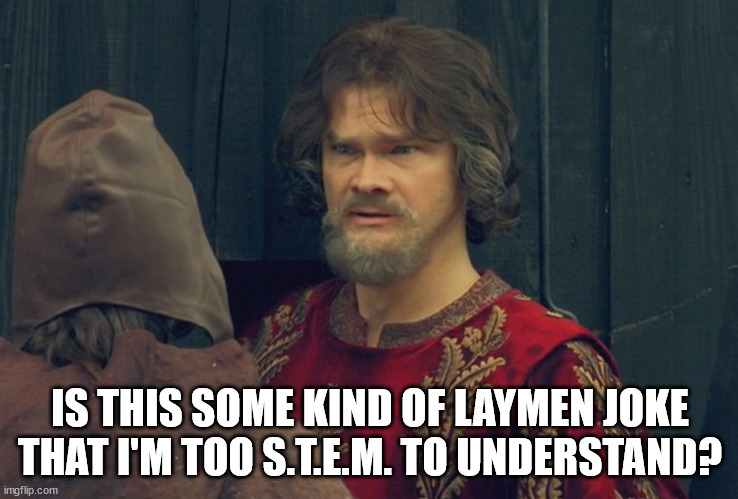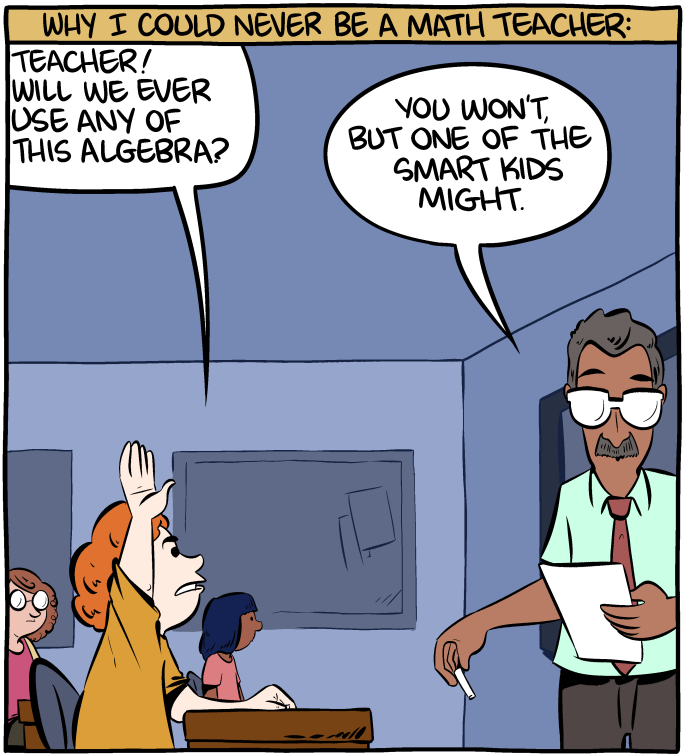Funny: Home of the Haha
Welcome to /c/funny, a place for all your humorous and amusing content.
Looking for mods! Send an application to Stamets!
Our Rules:
-
Keep it civil. We're all people here. Be respectful to one another.
-
No sexism, racism, homophobia, transphobia or any other flavor of bigotry. I should not need to explain this one.
-
Try not to repost anything posted within the past month. Beyond that, go for it. Not everyone is on every site all the time.
Other Communities:
-
/c/[email protected] - Star Trek chat, memes and shitposts
-
/c/[email protected] - General memes
It's also a day without using anything he learned in art, or geography, or chemistry, or English literature, or history, or pretty much anything he studied in school after age 10. Why does math get singled out?
Because hurr durr math hard
Because math is abstract and difficult to relate to. We should be taught practical applications of the abstract concepts, and the exam questions should be more practical.
yeah i think most of us were taught by people who didn't "understand" math either, so we don't really get what it is that we're doing, we just memorize the process to get the numbers to match, which isnt fun at all. I had a very difficult time in school with math.
When i was reintroduced to math functions as an electrician (and an adult) and the numbersoup actually described tactile, real world connections i had a much more fun time learning them.
I demand only the practical parts of art and history be taught in school.
Also - the questions that focus on practical applications are called word problems, and they get complained about more than anything else.
The reason why they're abstract and difficult to relate to is because we're all being taught maths backwards.
In science, a phenomenon is observed and then maths is used to create a set of equations describe it's behaviour. Then using the equations, other experiments can be designed to prove other hypothesises. This is known as the experimentalist approach to science.
Engineering is the same but less research and more application focused. For example, I need to design a wooden shelf that is A inches/meters long and supports B lb/kg of weight. How do I do that? Using trigonometry and Newtonian physics to work out the dimensions.
Finance is often used for basic algebra and calculus.
However, it is not always helpful to work in the material when using mathematics and the abstract is preferred. This is usually only useful for the theoretical approach in science, in theoretical mathematics, or at the cutting edge of engineering disciplines.
If we were taught by being presented with a problem first, I think it would make it easier to make the leap into the abstract when required for other applications. And on top of this, it would make it much easier for the majority who only ever need to use mathematics as a tool.
The biggest thing I learned from math was training yourself to think and problem solve. To always want to learn the next level of whatever you were learning, whether it's math English or whatever.
I don't think I've ever used much math knowledge in my life ... but it gave me the ability and enthusiasm of wanting to always want to solve a problem no matter how complex it was.
I literally, 30 seconds ago, used sin^-1() to calculate the angle for a roof I need to make for my indoor greenhouse, so the asshole cats don't fall through the cheap plastic

Always a good day when you have to break out arcsine
I make games. I use this shit daily.
I am studying physics. I can't even imagine a life with sin cos or tan... How do you guys perform a fourier transform without it?
We just prove a solution exists then get a physicist to actually do it for us.
You're also technically using them if you merely play games. Edit: You also use cos when making or viewing a jpg, so the author of the meme did in-fact use at least cos on that day.
I use these functions literally everyday.
It’s like having a pocket knife. Once you start carrying sin/cos/tan around everything looks like a trigonometric relationship
What for?
I am a machinist by trade. I have to know these functions in order to do machine setups, calculate points on a tangent radius, etc.
I think carpenters, framers, cabinet makers, etc use more math than I do day to day working as a devops engineer with an aerospace degree.
You use it, but it's all preprogrammed into the software you use, so you can focus on the bigger problems.
It's a bit like how microprocessors are designed modularly using programming language. No one physically lays out a transistor on a 7nm die, that's all dictated by code, where at the higher levels you just see "memory block" and "arithmetic block" or whatever.
Finite Element Analysis is some funky shit, though, and often that's done using bespoke software. You need to know the maths to build that, and it helps to have an understanding when interpreting the results. At least, it helps the person writing the report make a good report, though it's not like anyone else will know if they get it wrong.
This is dumb. Just because you don't use logarithms doesn't mean you never use deduction or process of elimination. Math is not solely about the numbers. The process is far more beneficial in many disciplines.
Also, the smart kids in class sure use them often enough.
The same vain is people arguing that schools should be teaching important things like budgeting, interest rates, taxes etc.
These things a trivial if you have the maths skills. These things are also subject to change, the maths doesn't.
Worst of all, these things are all taught (in Scotland), the people complaining about school not teaching them weren't paying attention.
I use them all the time for game development
My dnd group has pulled it out a time or two when cliffs are involved to figure out if you could get line of sight on someone.
We're all engineers of some kind.
Bro doesn't even use the internet, nor the electricity what a madlad
If you ever have to cut a bit of wood to act as a diagonal brace it's pretty useful to whip out the old tan. So I've used this every time I built a gate.
That's four times in the last decade, so not exactly daily but I'm glad I knew how to do it or my gates would have sucked.
I had a maths teacher who upon being asked, whats the point in maths? Or whenever he heard I'm not going to use this in the rest of my life! Would break into a ten minute speech. You have to study maths because what it is at it's core is just doing the same thing over and over again with slight variations. -more waffle I can't remember- and after school you will go off to some job where you do the same thing over and over again where you will spend the next 60 years of your life. And then you die.
It got quite depressing.
"No John, you probably won't ever have to use trigonometry in your life. But some of the smart kids probably will"
Machinist, Drafter, all about that SOHCAHTOA Life 🔫🔫😎
You're literally using a device powered by electricity that extensively relies on an understanding, implementation and exploitation of sinusoidal maths.
I was trying to figure out a problem the other day and realized that if I still remembered how to implement some sort of mathematical concept I learned back in high school I would've been able to do it. Made me want to call up a friend and say something like "it finally happened!"
If you use nothing from school then you’re going about life wrong. Reach higher.
y'all seriously don't SOHCAHTOA everyday?
This is the weirdest ad for MATLAB I've seen today
That man don't need no tan
I mean wasn’t soh cah toa written at that abandoned colony. Bad juju man
Cries in audio programmer.
I use a calculated sine wave to generate models of convoluted foam! (I'm a packaging engineer). And multivariable calculus can be used to predict cushion curves!
I always yearned to understand a practical reason to learn calculus. My teacher at college was a German woman that spoke English with a thick accent. Her joy for the course seemed self-evident, but she failed to ever share a real-world reason or application for what we were trying to learn. 45 years later,I still haven’t used what I “learned”, or ever came to understand why we did.
The thing is, without learning basic math and physics in school, most people would probably be flat earthers or some other type of degenerates.
Without knowing/understanding that it's possible to go the moon, or understanding why rubbing a stick against another stick makes fire, all the nonsense ideas that are the "easiest" to accept would prevail.
Let's say I tell you that 2+2=5. If you know that 1+1=2, you can reasonably deduct that what I'm saying is false. If you know or atleast have seen how to do calculations with gravity, you can reasonably understand that it's possible to figure out how to put a rocket in space. You probably won't be able to do it yourself, but you understand that it's possible.
I always yearned to understand a practical reason to learn calculus.
I use my understanding of second and third derivatives and the risks and how they affect the likelihood of black swan events - to choose (strongly influence) who loses when playing a game of "Liars Dice". So there is that, I guess.
On a more serious note, lots of things in personal finance are a bit easier to understand with a functional understanding of derivatives and integrals. It's not critical, but it makes stuff like the compounding time effect of interest more accessible, I think.
Edit: If I could change one thing about pubic schools, I think everyone should get a chance to take stats or probability for free. It helps so much with so many areas of life.
pubic schools
My favorite kind of typo right here.
If you listened to music, your phone used them about a billion times. ... well, not exactly since more efficient algorithms than full perfect computation exist, but...
Same for GPS, cell signal processing, camera functions... They're all over the place. Taking that picture required it.

